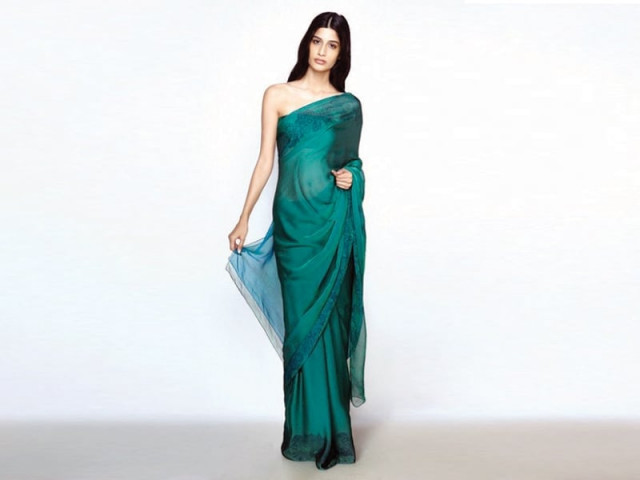Fashion mix: Hermes embraces saris
The expensive French brand incorporates Indian spice in its new collection.

Fashion mix: Hermes embraces saris
Hermes — named after the great messenger of the gods in Greek mythology — is a French high fashion house established in 1837. Today, the exorbitantly high-priced brand specialises in leather, lifestyle accessories, perfumes, luxury goods and ready-to-wear.
In 2000, Hermes moved the clothing segment to China and now the demigod of a brand has turned its attention towards subcontinental tastes and traditions. Following the recent opening of its flagship store in Mumbai — its third in India — the luxury house launched a limited edition of five Indian saris last week. “This is part of our effort to connect to India’s culture and to the tradition of elegance of Indian women,” president of Hermes India Bertrand Michaud told AFP.
Will Indian designers fight out Hermes?
Designers in India feel that the launch of these high-priced saris will bring healthy competition in the market. They also believe that it will open doors to extra creativity and experimentation.
“Of course, they have understood the taste and what kind of customer they want to target; so it will really be fun to watch,” states designer Samant Chauhan. “Also, it will be beneficial for Indian designers because it will increase competition and it will push them to bring out new experiments in their designs,” he adds.
Hermes opened its first store in India in 2008 in the Oberoi Hotel and after recently opening another store in Mumbai, it has launched these exclusive saris. There are a total of 28 saris that are priced between INR300,000 and INR400,000 restricting to the very wealthy lot.
Designer Anand Bhushan, a well known name in the fashion world in Delhi and Mumbai, feels such a move is welcomed in the world of ruthless competition. “We have been taking our clothes internationally and selling it around the globe to their women. So they too are entitled to do the same. It is a cut-throat business and you take it as it comes,” he explains.
In the past, luxury brands such as Etro, Canali and Ermenegildo Zegna have rolled out India-inspired products, from clutches and watches, to shoes and jackets. But Hermes is the first ever luxury label to introduce a complete sari range.
Before this, Italian designer Valentino had designed a sari dress for Jacqueline Kennedy, wife of late US president John F Kennedy in the 1950s. About five decades later in 2008, French fashion designer Jean Paul Gaultier had showcased a line of sari dresses in his Spring/Summer collection.
However, designer Anupama Dayal feels Indians are biased towards international brands because even though the saris are very expensive, there will still be takers. “I really wonder why spending becomes restricted when a person has to choose between an Indian designer and an international brand. We are still at a point where Indian designer wear is very reasonably priced and what you are getting is treasure,” she states.
Will Pakistanis embrace Hermes saris?
Even though Hermes flowed into the subcontinent only recently, its loyalty in the Eastern part of the world had been cemented years ago by the extravagant lot from India and Pakistan, who fly to fashion hubs like Dubai and London to buy designer products.
A pioneer in Eastern bridal wear, designer Hassan Sheheryar Yasin is of the opinion that, “Product diversification is the key in luxury, and I think it is extremely clever of a brand like Hermes to see the potential in a fast growing economy like India and harness it.”
The Pakistani designer also believes that the saris will definitely have an appeal amongst local brand lovers as these creations are in touch with Pakistan’s traditions and culture and at the same time have a quintessential feel of the exclusive French brand.
WITH ADDITIONAL INFORMATION FROM IANS.
Published in The Express Tribune, October 18th, 2011.



















COMMENTS
Comments are moderated and generally will be posted if they are on-topic and not abusive.
For more information, please see our Comments FAQ